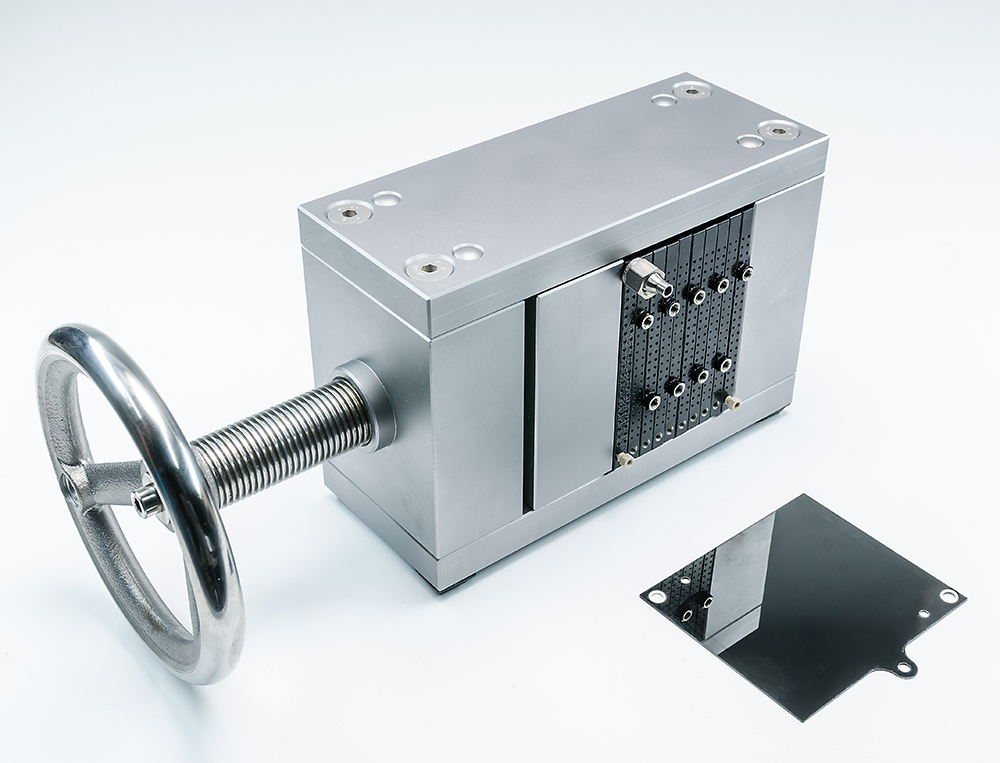Dissertation Nils Baumgarten
Influence of operating conditions and recycling concept on energy efficiency, selectivity and stability in continuous electrochemical synthesis
We congratulate Nils Baumgarten on the successful defense of his doctoral thesis in the field of electrochemistry. Baumgarten's thesis deals with an electrochemical microreactor for carrying out electrochemical syntheses in continuous operation and studies the influence of operating conditions on selectivity and energy efficiency. To this end, he has developed a modular and flexible concept electrochemical microreactor and set up a pilot plant to develop a continuous electrolysis process.
Nils Baumgarten is a research associate in the Division Chemistry at Fraunhofer IMM. The defense of his dissertation on " Influence of Operating Conditions and Recycling Concept on Energy Efficiency, Selectivity and Stability in Continuous Electrochemical Synthesis" took place on April 24, 2023 at the Technische Universität Darmstadt.
Abstract


Electroorganic chemistry enables the development of new and sustainable synthesis routes. To carry out electrosyntheses, suitable flow reactors are needed which allow the development and screening of the syntheses on a laboratory scale and at the same time allow the transfer to pilot scale. For this purpose, Fraunhofer IMM developed a modular and flexible reactor concept. The aim of this work was to evaluate the electrochemical microreactor and integrate it into a pilot plant for the development of a continuous electrolysis process.
As first model reaction to evaluate the reactor the aromatic C-C coupling of 2-Naphthol in acidic organic electrolyte was carried out. By reducing the residence time, the overoxidation of the electroactive substrate and the resulting coverage of the Boron-doped diamond anode with an organic layer could be significantly reduced. Within recycle experiments, yields of up to 50percent could be achieved with almost complete conversion, although overall selectivity and productivity were reduced due to increasing electrode coverage and ongoing consumption of the electroactive substrate. Moreover, a correlation between current density- and conversion-curves as a function of reaction time was detected. Due to the increasing electrode coverage and a generally more complex process for separation and electrolyte work-up of the single-phase system, the electrolysis was not transferred into continuous operation.
Furthermore, Kolbe electrolysis of n-octanoic acid was carried out in aqueous electrolyte under basic conditions. For current densities of 0.3-0.5 A/cm2 and reduced residence times high selectivity for Kolbe products was obtained (up to 96percent). The modularity and flexibility of the reactor concept was demonstrated by a synthesis in a divided cell setup, application of back pressure (up to 25 bar) and parallel operation of up to 4 cells. By further developing the anode material to platinized titanium, better long-term stability of the electrodes could be achieved. Due to the spontaneous phase separation of the reaction mixture, the aqueous phase could be isolated and reconcentrated with fatty acid and KOH. The made-up electrolyte was used again as educt feed. A pilot plant was set up to realize and carry out this process. In the continuously operated process, the degree of conversion of fatty acid reduced from 62 percent to 26 percent and the Kolbe selectivity from 92 percent to 84 percent within a reaction time of 4 hours. The studies indicate that the accumulation of carbonates in the electrolyte due to the reaction of KOH and CO2 is responsible for the observed effect. By semi-continuous operation with CO2-stripping before KOH and fatty acid addition it was shown that mainly the increasing KHCO3 concentration deteriorates the electrolysis performance.
 Fraunhofer Institute for Microengineering and Microsystems IMM
Fraunhofer Institute for Microengineering and Microsystems IMM